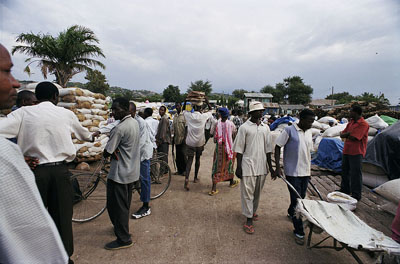Enhancing Natural Resource Management in Africa

Summary
The governments of Cameroon and Ghana wanted to use oil and gas revenues more effectively to promote economic growth and reduce poverty. They also wanted to improve transparency and accountability in the sector. However, Cameroon and Ghana, as well as many other African countries, have had difficulty managing and sustaining the windfall wealth and savings from their natural resources. With funding provided by both the South-South Facility and the Knowledge and Learning Center, World Bank staff organized a conference in South Africa, where high-ranking African officials involved in managing natural resource revenues and civil society representatives could learn from Latin American (LAC) peers. Many LAC countries have successfully dealt with challenges similar to those that Africa now faces. Countries such as Chile are forerunners in designing safety net systems for poor consumers, enhancing food supply through innovations in technology, and improving policies and institutions to manage commodity price volatility.
The exchange helped the African participants realize that they need to change the policy environment and take ownership of the reform agenda. They learned how to increase transparency and achieve a more equitable distribution of natural resource wealth. Government officials and civil society representatives engaged in the discussions, working to formulate strategy and policy frameworks for their respective countries in consultation with their Latin American counterparts. Thus the exchange also improved cooperation between governments and civic organizations.
Beneficiaries / Participants
For developing countries with significant natural resources, rising commodity prices present a golden opportunity for economic growth and development. However, managing and sustaining this new wealth has challenged many countries. Both Africa and Latin America are heavily dependent on a wide range of resource-based sectors. While prices may fluctuate, increased demand in the high-growth economies should ensure increasing prices in the foreseeable future. The governments of Cameroon and Ghana wanted to maximize the mobilization and effective use of oil and gas resources to promote economic growth and reduce poverty. Despite the two countries’ resolve to improve accountability and transparency in natural resource management, lack of cooperation among key stakeholders still cripples the sector. Additionally, citizens do not view natural resources as a public good benefiting all. Further, many African governments must cushion the adverse impacts of increased food prices, while managing both sector and macroeconomic policies to get the most out of the boom in natural resource prices. In Ghana, for example, there is a continuing debate on how to enforce the sound oil and gas sector laws already in place. The government does not have the capacity to formulate and implement policies that balance development with the interests of the powerful and well-organized corporations involved in the sector.
In the past, many Latin American countries faced similar sector challenges. Today they are leaders in designing safety net systems for poor consumers, enhancing food supply through technology innovations, and improving policies and institutions to manage commodity price volatility. Chile and Bolivia, for example, have managed to use their extractive industry revenues to generate growth and reduce poverty. Using funding provided jointly by the South-South Experience Exchange Facility and the Knowledge and Learning Center, the World Bank organized a conference for Ghana and Cameroon, as well as representatives from 19 other African countries, to meet with peers from Chile and Bolivia. The knowledge exchange aimed to increase awareness of resource management ownership and equip stakeholders to demand greater accountability in the sector in their home countries.
Moving forward
This first dialogue created the foundation for future exchanges between the two continents on management of natural resources. The Johannesburg conference inspired a similar forum organized by the International Monetary Fund in Kinshasa in March 2012, which also relied on South-South cooperation to bring tailor-made advice to African governments.

 China
China Colombia
Colombia Denmark
Denmark India
India Indonesia
Indonesia Mexico
Mexico Russian Federation
Russian Federation Spain
Spain United Kingdom
United Kingdom